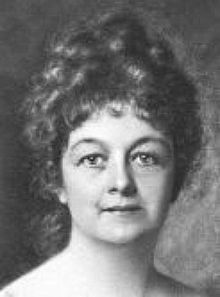Katrina Trask

Katrina Trask (May 30, 1853 – January 8, 1922), also known as Kate Nichols Trask, was an American author and philanthropist.
Life account
She was born Kate Nichols in Brooklyn, New York to George Little Nichols and Christina Mary Cole. Her father was a partner in a large importing firm.
She married Spencer Trask, a prominent Wall Street banker and financier, on November 12, 1874. Her husband was a director of several railroads and the president of the Edison Illuminating Company of New York. He also helped plan and finance the reorganization of the New York Times in 1896.
Katrina was the mother of four children, all of whom died in infancy or childhood. Spencer was killed in a railroad accident in 1909. In 1913 Katrina suffered several heart attacks and spent much of the remainder of her life developing and financing Yaddo, an artists' community in Saratoga Springs, New York, where she was an invalid.
On February 6, 1921, she married longtime family friend George Foster Peabody. Katrina died less than a year later in 1922, and is buried at Yaddo.[1]
Career
In 1878 she wrote Colorado Leaves, and in 1888 the Chronicles of Yaddo. Her first book, Under King Constantine, was published anonymously in 1892. The book contains three long love poems and was written in three days under intense mental strain. She hid the poems away for years until finally persuaded by her husband to have them published. It went through five editions and beginning with the second edition she started identifying herself as Katrina Trask.
She published Free Not Bound (1903), a novel, and Night & Morning (1907), a narrative in blank verse; both were about love and marriage. In 1908 she wrote King Alfred’s Jewel, a historical drama also in blank verse.
As an avid pacifist she wrote an antiwar play, In the Vanguard which appeared a year before World War I and went through eight editions and was performed by women clubs and church groups.
Works
- Colorado Leaves 1878
- Chronicles of Yaddo 1888
- Under King Constantine 1892
- Sonnets and Lyrics 1894
- White Satin and Homespun 1896
- John Leighton, Jr.: a novel 1898
- Lessons in Love 1900
- Free Not Bound 1903
- Mors Et Victoria [a Drama] 1903
- Night & Morning 1907
- King Alfred’s Jewel 1908
- In the Vanguard 1913
- The Statue of Peace 1914
- The Mighty and the Lowly 1915
- The Invisible Balance Sheet 1916[2]
- Without the Walls: A Reading Play 1919
References
- ^ "Katrina Nichols Trask". findagrave.com. Retrieved November 24, 2016.
- ^ New York Times Book Review, November 19, 1916
Sources
- Weber, H. R. "Trask, Kate Nichols" Notable American Women, Vol. 3, 4th ed., The Belknap Press of Harvard University Press, 1975
